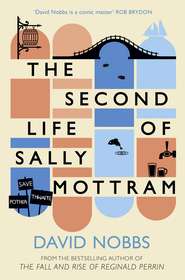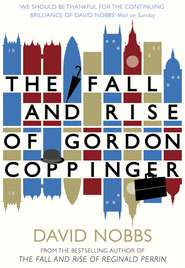По всем вопросам обращайтесь на: info@litportal.ru
(©) 2003-2024.
✖
The Itinerant Lodger
Настройки чтения
Размер шрифта
Высота строк
Поля
“80.”
“72.”
“I thought it was a 75,” volunteered a confectioner.
The Inspector immediately stopped the bus, his whole frame quivering with excitement. He used so little energy up in the rest of his life that he had a great surplus of intensity waiting in reserve for situations such as this. He got out of the bus and went round to the front.
The board indicated a 65, bound for Huggenthorpe! This was clearly false. The 65 went to Stoneytown Bridge, unless it was turned round at Sodge Moor Top. The Huggenthorpe bus was a 67, and in any case Huggenthorpe was in the opposite direction, beyond Market Edge. He stormed back to the bus in a carefully calculated fit of uncontrollable temper and confronted Fletcher, who was standing on the platform in great distress.
“Well?” said the Inspector, and waited patiently for a reply. Time was on his side.
“I don’t understand it.”
“Well I certainly don’t.” The Inspector led the way upstairs, and he immediately noticed that the four front seats were empty. Four youths, he remembered with the facility born of long experience, had been sitting there like a display of barrack room brooms. The back of the indicator board—one of the old type that are adjusted from upstairs—was open. He turned towards Fletcher.
“You left the indicator board unlocked. That’s what’s happened. Those four youths have changed the board between each stop. You see what happens when you let too many people on a bus.”
The public, their free journeys forgotten, turned on the man whom they held responsible. Ugly mutterings arose, and the Inspector, his triumph complete, felt able to protect his conductor from their threats.
When he had quietened the passengers the Inspector made a brief inquiry and found that only ten of the passengers were bound for stops on the 92 route. Routes on which passengers believed themselves to be travelling included the 87, 83, 80, 77, 75, 72, 68 and 65.
His inquiry over, the Inspector apologised to the passengers and told them that their tickets would be valid for the return journey to the City, where they could catch their proper buses. He informed the passengers who wanted the 92 route that they would have to wait for the next bus, as Fletcher had developed a defect and was being taken out of service. They grunted, as if to imply that it was not his fault, and then, casting ugly glances at Fletcher, they stepped out into the snow.
The Inspector went round to the cab and spoke to Driver Foster. “Why did you do nothing about all this, Foster?” he asked.
“All what, sir?” asked Driver Foster.
“All this overcrowding on the bus,” said the Inspector.
“I obey the bells, sir. Two rings, and I start. One ring, and I stop. Three rings, bus running to full capacity. And I’ve never once had three rings. Two, one, but not three. I’ve never once had the bell that indicated to me: ‘Bus running to full capacity.’ So there’s never been any reason for me to bother with overcrowding.”
“Drive us back to the garage, Foster,” said the Inspector.
Fletcher and the Inspector sat side by side in the empty bus as they drove to the garage. Only a few sweet papers and cigarette ends bore witness to the fact that the bus had ever served a useful purpose in society—or ever would again.
“I’m taking you to see the Chief Inspector, Fletcher,” said the Inspector.
“Yes, sir.”
“Why can’t you be more like Foster?” the Inspector asked sadly.
Fletcher could think of no reply.
Chapter 9
“THIS IS AN ODD BUSINESS, FLETCHER,” SAID CHIEF Inspector Wilkins, and even as he spoke Fletcher felt that this was a man to whom he would be able to talk.
“I wanted to serve,” he said.
“There’s nothing wrong in that, though it has never appealed to me,” said the Inspector. “But who did you want to serve?”
“Everyone.”
“That explains why there were 215 people on your bus, does it?”
“Well, sir, I don’t see why I should refuse anyone admission.”
“The bus might become overcrowded. Didn’t that occur to you?” Fletcher was silent, and the Chief Inspector continued: “Injuries might have occurred. Fire might have broken out in those crowded conditions. Didn’t you think of that?” Ninety-nine Chief Inspectors out of a hundred would have confined themselves to the regulations and attempted to have Fletcher certified. Chief Inspector Wilkins—although he had never let anyone suspect it, especially his wife, to whom he was happily married—was the hundredth man in any gathering.
“I don’t see who I could refuse to admit?”
“You are supposed to allow five standing.”
“But which five? If one five, why not another?” There was a brief pause. The Chief Inspector, man in a hundred though he was, felt justified in being taken aback. “Why not ten, fifteen, twenty, twenty-five, sir?”
“Or four hundred and twenty-five, Fletcher. You have to stop somewhere. There isn’t room for everybody. We stop at five.”
“But you still have to decide which five, sir.”
“You should allow the first five on. It’s only fair.”
“I’m afraid I can’t agree with you, sir,” said Fletcher. He was frightened of saying this, but there could be no stopping, now that he had taken the plunge.
“No?”
“It seems very unfair to penalise the second five for the fact that there are already five people on the bus. The first five are entirely to blame for that.”
There was a pause, which the Chief Inspector broke very lamely. “It is necessary to have rules sometimes, you know,” he said.
Fletcher said nothing. He was not convinced, nor was Chief Inspector Wilkins.
“I’m going to tell you something,” said the Chief Inspector. “I have never myself regarded buses as being for the use of the public. I don’t think it’s hard-heartedness, although as I told you the idea of service has never appealed to me. I think I like the public tolerably well, on the whole. I wish them well, generally speaking. But I have never been able to accept, in my heart of hearts, that buses are functional. I love them. I love them for themselves. You understand what I mean?”
“Yes, sir.”
“I love my wife, I suppose, but I love buses more. Hilda’s a very good woman, in her way, and we get on well, but you couldn’t love her for herself. I love her for her meals, her children, the home she runs. Take all that away and our marriage would collapse. But buses are different. I’d like to drive them around empty. I like their elegant, gently sloping fronts and their comforting square radiators. I—well, I love them. It’s monstrous that they should be used to carry people to cemeteries and supermarkets. Monstrous. Quite, quite monstrous.” Chief Inspector Wilkins recovered himself and resumed in a more conversational, less emotional manner. “I once wrote a paper arguing that the public were a penance paid by all bus people for the original sin implicit in the erection of the first bus stop. That sort of thing doesn’t go down too well in Omnibus Mansions. My attitude to buses is oriental. I admire their purity, their serenity, their detachment. Press the self starter and all that is lost.” He smiled at Fletcher. “I’ve kept all this to myself for twenty years, and now I’ve told you, so you see you have achieved something,” he said. Fletcher smiled back, shyly, and the Chief Inspector continued. “Yes, Fletcher, I was forced to admit, for the purpose of my life on earth, that buses have a function. If I’d told anyone what I’ve told you, I’d have been certified. One has to be careful, Fletcher, and that goes for you too, you know. So, please, go away, get another job, and be careful.” The Chief Inspector stood up and held out his hand. “I’ve spoken to you as a man. Now I appeal to you as a Chief Inspector. You’re fired. You’ll get a week’s pay in lieu of notice.”
Fletcher felt immeasurably betrayed. He had told this man of his opinions openly and without hesitation, and that was a miracle. He had listened to a confidence without embarrassment, and that was a miracle too. And then he had been sacked. As he went out into the late morning he felt a broken man. The sky was the colour of slush, and the wind was cold, and there was one week’s pay in his pocket, as he tacked through the cold, grey nothing.
Chapter 10
“WHAT I ALWAYS SAY,” SAID MRS POLLARD, “IS THAT if a man can’t face these setbacks with a smile he isn’t a man.”
Fletcher faced this setback with a thin, wan smile. Mrs Pollard, who had seen little of him during the past fortnight, what with his shift work and everything, had been surprised to see him back so early, but she had not been nearly so surprised when he told her that he had lost his job. She had given the impression that she had known all along that he wasn’t the man for bus conducting. There was something, she let it be felt, too intelligent about him. It was not that he had told her anything about his schemes, but she had not failed to notice his studious and distant manner in the evenings. There had been nothing she could do. It had been man’s work, and Mrs Pollard had been a landlady far too long to interfere with that. She knew that she must wait until the moment came for her to swing into action, and that when the moment did finally come she must swing with all her might.
“I’ll have a nice bowl of stew ready for you in a jiffy,” she said. “Pollard always used to say there’s nothing like a nice hot stew to cheer a man when he’s down. Warm the stomach and you warm the heart.”
While Mrs Pollard was making the stew, Fletcher sat before his table, as motionless as possible, patiently awaiting the upsurge of some new emotion. Very soon he found himself in a silent world. He rolled the silence smoothly round his brain. It was a silence that might never end. It was his own silence, his great eternity, in which he might sit whenever he wanted, in his usual chair. Whenever the mood took him, whenever he felt unusually battered and bruised, he could return to it and find himself sitting there. As a point of reference it had few equals, but as a refuge it had a draw-back. It could be—and invariably was—interrupted. Perhaps he would never know what had interrupted it, and he would slide gently out of the silence. He would hear all the noises of the world as if they were far away, but coming closer, and he would begin to feel, faintly at first, like the light from the distant opening of a tunnel, his hunger. And then it would get nearer and nearer until he was suddenly out again in the sunlight, fully exposed to all his needs and fears.











